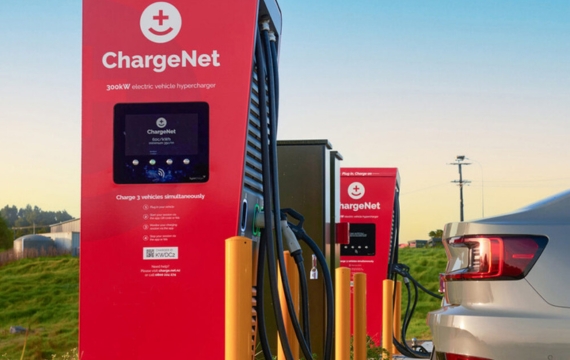Electric vehicle charging infrastructure
First Rescue
Keep your cars on the road
Planning your charging infrastructure is one way to ensure a smooth move to an electric fleet.
Charge at home, on-site or on the go
Ease and convenience. That’s what your drivers know when it comes to refuelling conventional vehicles. Keep your employees and drivers happy with these simple solutions to charge your electric vehicles, wherever they may be.
Workplace charging

Cost-effective charging solutions
We’ve teamed up with JetCharge, one of New Zealand's electric vehicle charging infrastructure companies, to keep you on the road. To charge your fleet, we consider your unique fleet size, vehicle usage, office building parameters and whether an AC or DC charger would work for you. Together, we help you find a solution for your business.
Renting your workplace? No worries.
We’re about seamless installation, even when you’re renting your workspace. Working with Jet Charge, we offer a proven process to engage with building owners, office managers, and other key stakeholders. From kick-off meeting to building assessment, and installation, we’ve got you covered.
At home charging

As easy as charging your mobile phone
Most electric vehicles come with a charger that plugs into a normal, three pin electric plug. We also offer charging solutions that can be installed in your employees’ garage or outside wall – simple.
Intuitive reporting
We recommend choosing a mode 3 electric vehicle charger model that’s connected to a smart charger. This will help you easily manage reporting and reimbursement around electricity expenses.
Public charging

There’s an app for that
Help your drivers easily find one of the nationwide electric vehicle charging stations while they’re on the road, via the ChargeNet EV charging network app. Downloadable from App Store or Google Play.
EV charge card
Offer your employees a familiar way to charge their EV – an EV RFID tag – similar to a conventional fuel card. We can issue your drivers a ChargeNet RFID tag to be used at ChargeNet public charging stations around New Zealand and charge the sessions back to your account.
EV roadside charging

Beat low charge anxiety with EV Roadside Assistance
First Rescue, our partner for roadside and breakdown assistance, has expanded its capabilities to help our EV drivers if they get stuck with a low charge. FleetPartners driver’s can now get a rapid charging service for their electric vehicle on the road. First Rescue’s LDV eDeliver3 roadside rescue vans are equipped with a high-performance 2kW transformer that can charge your vehicle enough for you to get to your next destination. This service is available in Auckland and soon to be rolled out across the country.
Electric vehicle charging FAQs
What is a standard versus a non-standard home charging installation?
The definition of a standard installation often varies basd on which EV Charging provider you are working with. The broad definition involes wall mounting an EV Charger on a dedicated circuit that is located within 10-15metres of the distribution board. Non-standard installs can arise from variations such as additional travel distance, insufficient electrical infrastrucutre, longer cable run between the distribution board and charger location.
Can chargers be installed in all homes? How do you handle homes with switchboards that can’t handle capacity or an apartment for example?
The majority of homes can accommodate the installation of an EV charger. Homes with old or insufficient switchboards are a common occurance and an electrician can provide an accurate quote for any upgrades. This can be done by viewing detailed photos, or occasionally through a site inspection.
Installing EV chargers in apartment settings presents challenges with metering, costs and equitable access to EV chargers. The two general approaches are to install an EV charger in a shared location and allowing users to access; or the body corporate installs the back-bone electrical infrastructure and each tenant pays for the supply and install of their charger.
Do chargers need to be installed in a garage or can they be installed on the side of a house or garage?
Chargers can be installed in both a garage or outdoors. Approved and reputable chargers are both water and dust resistant.
What is involved with a home charger installation?
Most homes can accommodate the installation of an EV charger without expensive electrical upgrades. The standard process involves the home owner (or renter with landlord consent) providing photos of the proposed EV charger location, the distribution board and the proposed cable path between the distribution board and the proposed charger location. The installation typically takes 4-6 hours and must be completed by a licensed electrician.
What percentage of installations would be considered standard and what is the average cost of an install?
The majority of home EV charger installations are standard. The site survey process of providing the required photos can help an electrician identify potential variations prior to the install. For a single phase home, the general cost for the supply and install of an EV charger is $2,500-$3,500. Three phase homes generally cost around $3,000-$4,000.
Future proof your charging infrastructure
Together, we can find an appropriate charging solution for your unique business and ensure easy, reliable electric vehicle fleet charging.
How It works
Home versus workplace charging
- Before you install an electric vehicle fleet charging station at your employees home, consider how they use their vehicle.
- Is their vehicle parked at your office during the day or overnight? Workplace charging might be best.
- Are they always on the road? You may benefit from at home charging.
- We can help you choose a charging network that meets your business’s unique needs.

jump start your sustainable vehicle journey

